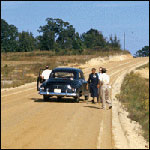CDC Features
US Public Health Service Syphilis Study at Tuskegee

The United States Public Health Service (USPHS) Syphilis Study at Tuskegee was carried out in Macon County, Alabama, from 1932 to 1972. The USPHS, in trying to learn more about syphilis and justify treatment programs for blacks, withheld adequate treatment from a group of poor black men who had the disease, causing needless pain and suffering for the men and their loved ones.

In the wake of the Tuskegee Study and other studies, the federal government took a closer look at research involving human subjects and made changes to prevent the moral breaches that occurred in Tuskegee from happening again.
Serving those who served
The Tuskegee Health Benefit Program is a congressionally mandated program that provides comprehensive lifetime medical and health benefits to the affected widows and offspring of study participants. A total of 19 widows and offspring are currently receiving benefits. The vast majority of the participants reside in the Alabama area, while others live in the Midwestern and Northeastern parts of the United States.
Additional Information
Page last updated: April 15, 2008
Content source: National Center for HIV/AIDS, Viral Hepatitis, STD, and TB Prevention
Content owner: National Center for Health Marketing
URL for this page: www.cdc.gov/Features/Tuskegee


